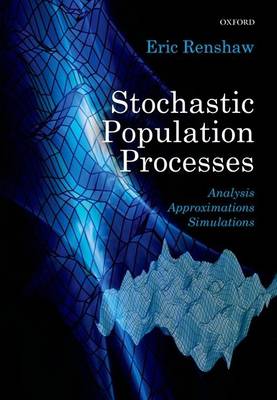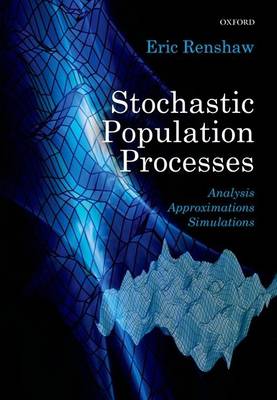
- Retrait gratuit dans votre magasin Club
- 7.000.000 titres dans notre catalogue
- Payer en toute sécurité
- Toujours un magasin près de chez vous
- Retrait gratuit dans votre magasin Club
- 7.000.0000 titres dans notre catalogue
- Payer en toute sécurité
- Toujours un magasin près de chez vous
Stochastic Population Processes
Analysis, Approximations, Simulations
Eric Renshaw
Livre broché | Anglais
87,95 €
+ 175 points
Description
The vast majority of random processes in the real world have no memory - the next step in their development depends purely on their current state. Stochastic realizations are therefore defined purely in terms of successive event-time pairs, and such systems are easy to simulate irrespective of their degree of complexity. However, whilst the associated probability equations are straightforward to write down, their solution usually requires the use of approximation and perturbation procedures. Traditional books, heavy in mathematical theory, often ignore such methods and attempt to force problems into a rigid framework of closed-form solutions. This text, strongly oriented towards problem solving, has three aims. First, basic analytic tools are introduced through a suite of stochastic processes which do possess relatively simple closed-form solutions. Second, techniques are presented that enable the extraction of considerable behavioral information even when exact probability structures are intractable to direct solution. Third, a range of simulation procedures is proposed which provide insight into the way that particular systems develop - these often expose hitherto unforeseen features and thereby suggest further lines of exploration. Although the examples are slanted towards ecological and physical applications, only a little imagination is required in order to apply the techniques to problems generic to engineering, chemistry and finance. Indeed, the book provides a rich source of ideas for anyone working with random processes who is prepared to take a flexible approach. Many aspects of population dynamics are covered, including: general birth-death and power-law processes; random and correlated walks; Markov chains; perturbation and saddlepoint techniques; Wiener, Fokker-Planck and Ornstein-Uhlenbeck diffusion processes; general bivariate processes, including predator-prey, competition, epidemic, cumulative size and counting systems; MCMC and simulation techniques; and velocities, dynamic structure, Turing ring systems and cellular automata for spatial-temporal systems. Extensions include fractal structure from power-law contact distributions, and marked point processes. Since little of the material is covered at a deep mathematical level, the book will be readily accessible to a wide range of researchers and practitioners, and provides an excellent basis for constructing novel undergraduate and postgraduate courses in applied probability. The unified approach exposes the high degree of linkage that exists between apparently unconnected processes. The book can also be treated as a toolbox to be dipped into in order to select specific analytic and computational techniques.
Spécifications
Parties prenantes
- Auteur(s) :
- Editeur:
Contenu
- Nombre de pages :
- 672
- Langue:
- Anglais
Caractéristiques
- EAN:
- 9780198739067
- Date de parution :
- 19-05-15
- Format:
- Livre broché
- Format numérique:
- Trade paperback (VS)
- Dimensions :
- 168 mm x 239 mm
- Poids :
- 1156 g

Les avis
Nous publions uniquement les avis qui respectent les conditions requises. Consultez nos conditions pour les avis.






